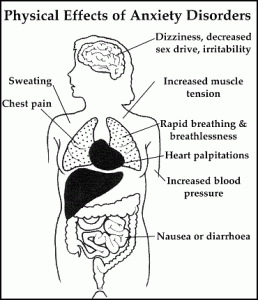Carrie Underwood opens up about her panic attacks

Country music superstar Carrie Underwood, 27, revealed to WebMD the Magazine that she has suffered from panic attacks since high school. The Season 4 American Idol winner, who has gone on to win multiple Grammy Awards, become a Grand Ole Opry inductee, a three-time Academy of Country Music and Country Music Association Female Vocalist winner, and the current ACM Entertainer of the Year, originally grew up on a small farm in Checotah, Oklahoma.
According to WebMD, Underwood began to suffered from panic attacks in high school. Christmas shopping “seemed to be my worst nightmare,” she says. “I’m a big personal space person. You know, if you go to the restroom, you use the stall that’s not near anybody. Or if you’re in the gym, you go to the treadmill where there’s space in between you. And it seemed like in crowded situations like that, people would just completely violate your personal space. So whenever I’d be in stores and there would be people touching me and kids running around, I couldn’t take it and I’d have to leave.”
Becoming the American Idol winner put her in many situations where she had to be amongst groups of excited fans. “They feel like they know you and they love you and that’s wonderful — they’re excited to meet you,” she says. “It just took me a minute to be able to figure that out and to be able to allow people into my space.”
Panic Disorder (Source: National Institute of Mental Health)
 Panic disorder is a real illness that can be successfully treated. It is characterized by sudden attacks of terror, usually accompanied by a pounding heart, sweatiness, weakness, faintness, or dizziness. During these attacks, people with panic disorder may flush or feel chilled; their hands may tingle or feel numb; and they may experience nausea, chest pain, or smothering sensations. Panic attacks usually produce a sense of unreality, a fear of impending doom, or a fear of losing control.
Panic disorder is a real illness that can be successfully treated. It is characterized by sudden attacks of terror, usually accompanied by a pounding heart, sweatiness, weakness, faintness, or dizziness. During these attacks, people with panic disorder may flush or feel chilled; their hands may tingle or feel numb; and they may experience nausea, chest pain, or smothering sensations. Panic attacks usually produce a sense of unreality, a fear of impending doom, or a fear of losing control.
A fear of one’s own unexplained physical symptoms is also a symptom of panic disorder. People having panic attacks sometimes believe they are having heart attacks, losing their minds, or on the verge of death. They can’t predict when or where an attack will occur, and between episodes many worry intensely and dread the next attack.
Panic attacks can occur at any time of the day. An attack usually peaks within 10 minutes, but some symptoms may last much longer. Panic disorder affects about 6 million American adults and is twice as common in women as men. Panic attacks often begin in late adolescence or early adulthood, but not everyone who experiences panic attacks will develop panic disorder. Many people have just one attack and never have another. The tendency to develop panic attacks appears to be inherited.
People who have full-blown, repeated panic attacks can become very disabled by their condition and should seek treatment before they start to avoid places or situations where panic attacks have occurred. For example, if a panic attack happened in an elevator, someone with panic disorder may develop a fear of elevators that could affect the choice of a job or an apartment, and restrict where that person can seek medical attention or enjoy entertainment.
Some people’s lives become so restricted that they avoid normal activities, such as grocery shopping or driving. About one-third become housebound or are able to confront a feared situation only when accompanied by a spouse or other trusted person. When the condition progresses this far, it is called agoraphobia, or fear of open spaces (originally taken from the Greek expression for “fear of the market place”).
Since many of these symptoms mimic physical disorders, patients often have repeated physician or emergency room visits before they are diagnosed. It is unknown what causes panic disorders but they usually respond well to medications, talk therapy, or both. Additional measures to reduce stress, including meditation, yoga, biofeedback, and so on are also helpful in reducing anxiety and panic attacks.
For more information, click here to go to the Resounding Health Casebook on Anxiety Disorders.
























1 Comment